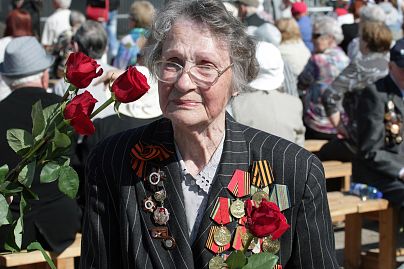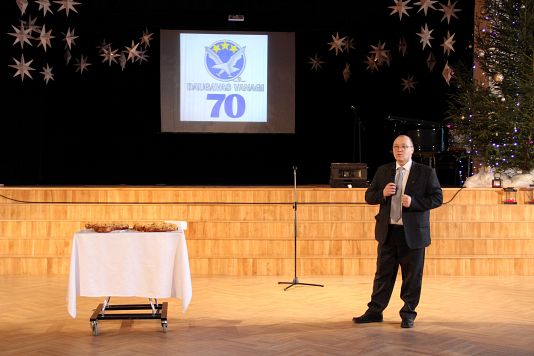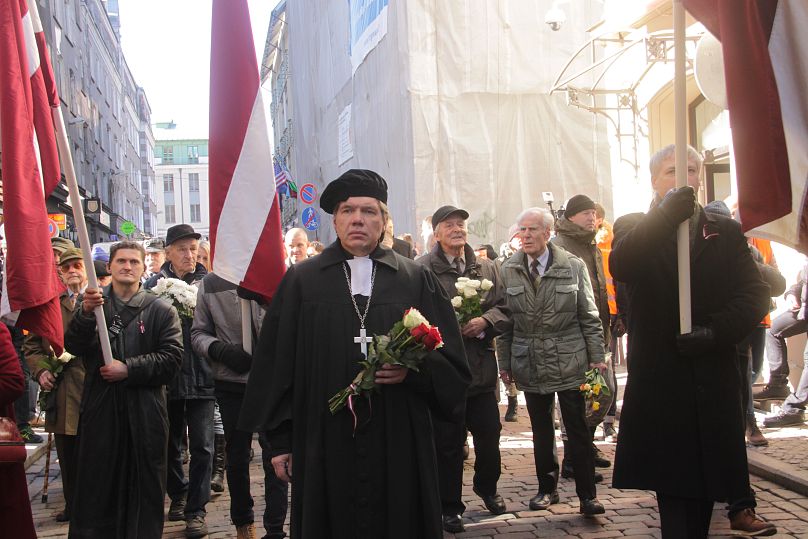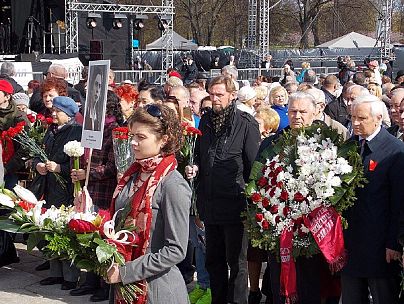Tracing back to World War II shows many Latvian families divided by the battlefield, with relatives literally fighting on opposite sides — some on the side of the Waffen SS and others with the Red Army.
A day after the rest of the European Union marks the end of the Second World War, a group of veterans will gather in Riga, Latvia for the so-called Immortal Regiment procession. The march, that originates in Russia and marks Soviet victory over Nazi Germany, sees people carry flowers and photos of their loved ones. The event, which features mainly ethnic Russians, is in its fourth year but is a sensitive topic for the country, which also remembers May 9 as the beginning of Soviet occupation.
 ADVERTISEMENT
ADVERTISEMENT
 ADVERTISEMENT
ADVERTISEMENT
“For me this is an event to commemorate my grandfathers and grandmothers”, says Margarita Dragile, one of the organisers. One of Margarita’s grandfathers voluntarily joined the Red Army and disappeared without a trace. The other grandfather was wounded on May 5 and died on May 9 just as the war had ended. Her grandmother survived the 900-day siege of Leningrad—today St Petersburg.
Families divided on the battlefield
During World War II, Latvia went through three occupations: first by the Soviet Union as part of the non-aggression pact between Stalin and Hitler, then by the Third Reich, and again the Soviet Union.
“In the 70s we had a neighbour, he fought for the Red Army in World War II,” says Gunars Grinbergs, a pensioner from the small town of Limbaži in northern Latvia. “He was recruited by the Russians in 1944, soon he was wounded, but he survived. His two elder brothers were mobilized earlier by the Germans. They both died”.
This is not unusual for many Latvian families. If you trace back to the Second World War, there will often be relatives who were on opposing sides; some joined the SS while others joined the Red Army. Grinbergs’ family is no different: his father Arvids was mobilized at the age of 18 to the 15th Waffen-SS Latvian division. So was his father’s stepfather — who later managed to defect to the Red Army and was even awarded a medal after the battle for Berlin. Gunars’ mother help prison for a time in the Salaspils concentration camp, which was located outside of Riga.
Latvia’s Waffen SS veterans: Perpetrators or victims?
Grinbergs in now head of the Limbaž branch of the Daugavas Vanagi’s, meaning Daugava’s Hawks, a nationwide organization that unites veterans from the Latvian SS-divisions. The organization itself was founded soon after the war, but outside of Latvia. Now its main office is in Riga. The idea is to unite and financially support veterans, but since 1990 Daugavas Vanagi is most famous for organizing the annual Memory Walk on March 16 — to commemorate the fallen soldiers of the 15th and 19th Waffen-SS divisions.
The date marks out the day in 1944 when the two divisions for the first time joined forces against Red Army.
The official attitude to the event is mainly neutral and lukewarm. Last year Latvian Prime Minister Māris Kučinskis called on his colleagues in government to ignore the date and the walk.
However, the public reaction played out on social media is usually more emotional. Many Latvians regard the ‘legionaries’ heroes, while others call them fascists. In 2009, Riga City Council banned the walk, but lifted the ban the following year. Strong criticism from European antifascist organizations followed, and the European Commission Against Racism and Intolerance put out a statement condemning “all attempts to commemorate persons who fought in the Waffen SS and collaborated with the Nazis”.
Opposing commemorations prompt strife
Those who mark May 9 also protest against the March 16 commemoration.
“My opinion is very strong on this point,” says Margarita Dragile. “The Waffen SS is the Waffen SS. It is insanity from all points of views. There are people who died on both sides, but history shows that they were in the wrong. Sure they can commemorate their soldiers, heroes, relatives, but at home, without bringing it out to the streets”.
This year a group of activists addressed a letter to the Ministry of Foreign Affairs, asking tfro the walk to be banned. The ministry, however, defended the march as an expression of free speech and the right to public gatherings.
Supporters of the controversial commemoration defend it on several counts. They argue most of the veterans had been mobilized under duress, and were cleared by the Nuremberg trials after the war.
“My father was mobilized. All young men were mobilized,” says Gunars Grinbergs. “He was just taken and sent to Germany. He had no choice. The 16th of March is the day of memory. These people need to gather together”.
Second, they say the day commemorates rather than celebrates or honours the Waffen SS soldiers. Grinbergs accuses the organizers of May 9 of doing the opposite, turning their day of memory into a celebration. “Stop drinking and raging in Riga on this day,” he said. “They’d do better to come to the countryside, there are so many memorials and graves of Soviet soldiers in terrible condition, better take care of them”.
Another argument is that legionaries did not take part in the Holocaust in Latvia, that saw 70,000 to 90,000 Jews killed. Most of the murders took place in 1941 and partly 1942, while the Latvian Waffen SS divisions were formed in 1943.
“What to make of the legionaries?” asks Marģers Vestermanis, Latvian historian and founder of the Jews in Latvia museum. He is one of the few Latvian Jews to have survived the Holocaust. “Over 75% of them were mobilized by force. For me, they are also victims”.














